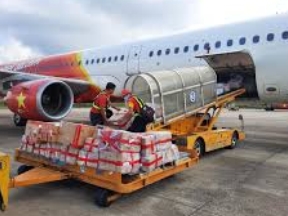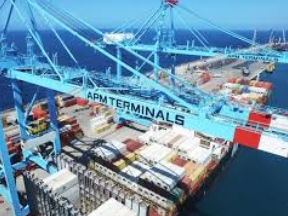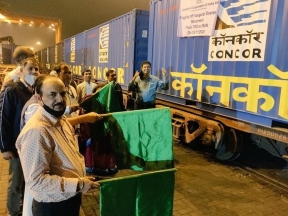JSW Infrastructure has completed the acquisition of Chettinad Group’s Port Business which allows JSW Infrastructure ownership and operational control of a deep draft international coal terminal and a Bulk Terminal at Kamarajar Port Limited (KPL) as well as coal and bulk commodity terminal at New Mangalore Port Trust (NMPT). The company is investing more than Rs 1,000 crore to acquire as well as modernise these Port assets which has a combined cargo handling capacity of 17 million tonnes per annum. Commenting on the development Arun Maheshwari, Joint MD & CEO, JSW Infrastructure said, “The successful acquisition of these Port assets consolidates our strategic presence across South East & West coast of India. It allows us greater access to the hinterland trading hubs with promising growth potential. These assets also fit our strategic direction to achieve 200 million tonnes per annum cargo handling capacity over next couple of years offering us an opportunity to service varied requirements of a wide customer base. The newly acquired Terminals will have business synergies with our upcoming 30 MTPA coal export terminal at Paradip Port Trust which is scheduled to commence operations during first half of calendar year 2021.” According to Devki Nandan, Senior Vice President & Head of M&A of JSW Infrastructure, “The newly acquired terminals are strategic assets for JSW Infrastructure. Their addition enables us to service higher volume of third-party customer cargo. We intend to modernise these terminals to further enhance their operational efficiency. This acquisition will immensely benefit all our stakeholders through better efficiency, reduced cost and a world-class customer service experience”.
Read More »Cool Chain Association launches COVID-19 airport matrix, helping airports prepare the vaccine logsitcs
Aimed at supporting airports to prepare their logistics for vaccines, the Cool Chain Association (CCA) has launched the Covid-19 Distribution Change Management Matrix. The Matrix looks at adherence to temperature requirements, packaging, forecast and quantity, and timeframe across different stages in a vaccine’s journey through an airport. The Cool Chain Association will share the Matrix with members for them to complete and then bring together the information to help the supply chain focus on potential pinch points, training needs, safety and security, as well as supplier and risk management, and quality. “CCA members can share vital information, which, once consolidated, will provide a useful resource as the industry prepares in the best way we can for the distribution of the vaccines,” said Nicola Caristo, Secretary General, the Cool Chain Association and Airline Partner Manager, SkyCell. “We are not aiming to suddenly find an end-to-end solution, but focussing on airports, where we know there are potential bottlenecks and where we can use the vast knowledge in our network to help establish workable guidelines.” The scheme was unveiled during association’s recent Covid-19 Taskforce Workshop, where the focus was on the need for both shippers and legislators to play their part. Guest speaker Ruud van der Geer, Global Deliver Strategy team MSD, said, “The pharma industry was working to be as prepared as possible in volatile times. The biggest challenge is that we have to develop a network, but there are still so many unknowns, from the required shipping temperature to where it will be manufactured and delivered, and the overall manufacturing capacity.”
Read More »CMA CGM launches ACT with CMA CGM+, enabling its customers to make their cargo carbon neutral
h an aim to help its customers to lighten their environmental footprint and make their cargo carbon neutral, the CMA CGM Group has announced that the group is launching ACT with CMA CGM+, an array of solutions. Available throughout all the Group’s shipping subsidiaries, this new offering consists of four services, enabling its customers to analyse their environmental footprint, use cleaner alternative energy sources and to offset the emissions generated during the transport of their goods. Cleaner Energy LNG and Cleaner Energy Biofuel: Two solutions delivering reductions in environmental footprint CMA CGM made the groundbreaking decision to power 26 of its containerships using liquefied natural gas by 2022, and seven of these are already in service. Thanks to the CLEANER ENERGY LNG offering, customers will be able to choose to transport their goods using LNG, a novel technology that helps to preserve air quality by eliminating almost all atmospheric pollutants. Through its greater energy efficiency and the use of renewable biomethane sources, this offering also delivers a significant reduction in greenhouse gas emissions. CMA CGM was also the first shipping group to successfully use biofuel on its containerships. Thanks to the CLEANER ENERGY BIOFUEL offering, the Group’s customers will be able to opt for a transport solution for their goods using biofuel generated from used cooking oil. These alternative fuel-based solutions can unlock reductions in greenhouse gas emissions of between 15% and 85%, providing CMA CGM’s customers with a wide range of solutions to decarbonize their cargo. Eco Monitor and Positive Offset: Two solutions for analysing and offsetting environmental footprints With Eco Monitor, the CMA CGM Group’s customers will be able to keep track of their environmental footprint in real …
Read More »Revised policy for CFS/ICD/AFS will address overcapacity concerns in the industry and is credit positive: ICRA
The Central Board of Indirect Tax and Customs (CBIC) has notified revised policy and guidelines for setting up of Container Freight Stations (CFS), Inland Container Deport (ICD) and Airfreight Stations (AFS). The revised policy aims to boost investment in CFS/ICD sector in underdeveloped regions in India, while the approvals in regions where already high concentration is there will be discouraged except in exceptional cases. Commenting on the policy, K Ravichandran, Senior Vice President and Group Head, Corporate Ratings, ICRA, says, “The new policy considers the issues faced by the sector; including regional disparities in concentration of facilities, with high concentration of CFS in Western and Southern regions and the adverse impact of new initiatives like Direct Port Delivery (DPD)/ Direct Port Delivery (DPE) on the CFS sector. While, the impact on volumes due to DPD implementation has stabilised to some extent, the margins have witnessed pressure and with growing investments in warehousing space, only CFS players with larger logistics offerings allowing them to re position their services will be able to continue in the long term. Hence, the zoning and distance rules in the revised policy will aid in more balanced development in the sector and prevent concentration of facilities which will improve the viability of existing/upcoming facilities by reducing competitive pressure.” ICRA notes that the revised policy has factored the developments in the sector in the last two decades, including the growth in volumes during this period; geographical concentration of CFS/ICD; implementation of schemes like DPD/DPE and other automation and efficiency improvement measures; and also, the infrastructure developments like Direct Freight Corridor and inland waterways.
Read More »Singapore Airlines to use IBS Software’s iCargo, enhancing visibility of shipments yield and revenue
With an aim to bring its global cargo operations onto a single integrated digital cargo platform to improve operational insight across its entire network, Singapore Airlines (SIA) has appointed IBS Software. This will be achieved through the deployment of IBS Software’s iCargo SaaS-based cargo management solution. The implementation will see SIA transitioning from its existing air cargo systems to iCargo to support its cargo business units, which include sales, import and export operations, air mail handling and revenue accounting. This will serve to strengthen its ability to better manage cargo capacity, gain enhanced visibility of shipment yields and revenues, optimise network performance and seamlessly collaborate with partners’ systems, as well as drive efficiencies and improve operational resilience. “The Covid-19 pandemic has challenged the air cargo industry and greatly accelerated the need for change, especially in digitalisation. We look forward to working closely with IBS Software to leverage the many strengths of iCargo to improve our digital capabilities and allow us to deliver a differentiated customer-centric quality of service, while staying compliant and up-to-date with global industry standards and initiatives.” said Chin Yau Seng, Senior Vice President Cargo, Singapore Airlines. “Singapore Airlines is an iconic brand in the airline industry, synonymous with innovation. It gives us immense pleasure to welcome them to the iCargo user community during these turbulent times. We greatly value the trust that Singapore Airlines has placed with us and I’m looking forward to our teams jointly developing the next generation of air cargo ecosystem for their customers and partners,” said, Gautam Shekar, Senior Vice President and Regional Head of Asia Pacific, IBS Software. iCargo is an integrated solution that supports the end-to-end business functions such as cargo …
Read More »IATA releases guidance for global vaccine distribution, ensuring air cargo industry’s readiness to support handling & movement
To ensure that the air cargo industry is ready to support the large-scale handling, transport and distribution of a COVID-19 vaccine, The International Air Transport Association’s (IATA) Guidance for Vaccine and Pharmaceuticals Logistics & Distribution provides recommendations for governments and the logistics supply chain in preparation for what will be the largest and most complex global logistics operation ever undertaken. Reflecting the complexity of the challenge, the Guidance was produced with the support of a broad range of partners, including the International Civil Aviation Organization (ICAO), International Federation of Freight Forwarders Associations (FIATA), International Federation of Pharmaceutical Manufacturers and Associations (IFPMA), Pan American Health Organization (PAHO) , UK Civil Aviation Authority, World Bank, World Customs Organization (WCO) and World Trade Organization (WTO). The guidance includes a repository of international standards and guidelines related to the transport of vaccines and will be updated regularly as information is made available to the industry. Accompanying the guidance, IATA established a joint information-sharing forum for stakeholders. “Delivering billions of doses of a vaccine that must be transported and stored in a deep-frozen state to the entire world efficiently will involve hugely complex logistical challenges across the supply chain. While the immediate challenge is the implementation of COVID-19 testing measures to re-open borders without quarantine, we must be prepared for when a vaccine is ready. This guidance material is an important part of those preparations,” said, Alexandre de Juniac, Director General and CEO, IATA. Key challenges addressed in IATA’s Guidance for Vaccine and Pharmaceutical Logistics and Distribution include the availability of temperature-controlled storage facilities and contingencies when such facilities are not available, defining roles and responsibilities of parties involved in the distribution of vaccines, particularly …
Read More »ALMAC Online opens; It is not govt business to govern the industry, we have to self-regulate ourselves, says, AMTOI Vice President
The 10th Asian Logistics, Maritime and Aviation Conference (ALMAC), an annual signature event for the industries jointly organised by the Government of the Hong Kong Special Administrative Region (HKSAR) and the Hong Kong Trade Development Council (HKTDC), opened today, running online for the first time in light of the pandemic. “The year 2020 has been a landmark year in many aspects, perhaps the most challenging year we have faced in our lifetime,” says, Xerrxes Master, Vice President, Association of Multimodal Transport Operators of India. Explaining the nature of Indian logistics industry, he continues, “The size of the Indian logistics industry is US$250 billion; it’s a highly fragmented industry with hardly 10-15 per cent owning by organised players. So, one can imagine the magnitude and sheer scale of industry and what it is really capable of. However, slow but steady the progress has been made at every step. Indian government, in the last five to 10 years, has really supported multi-modalism; one of the prime examples is the development of inland waterways and the coastline which has been neglected all these years and which has really not being used to its full potential. It is estimated that 14500 kms length of rivers are navigable throughout the year. The Inland Water Authority of India (IWAI) has declared five national waterways covering a total of 4,434 kms of inland waterways covering routes on river Ganga , river Brahmaputra , back waters of Kerala, Krishna and Godavari river system along with the Buckingham Canal and Brahmani Mahanadi river system along with East Coast Canal. In 2016 the government of India declared 106 navigable rivers as National Waterways also. India and Bangladesh have agreed upon …
Read More »Vietjet join hands with UPS for global cargo transportation from Asia
In a bid to leverage each other’s global and regional networks, Vietjet and UPS have entered an agreement. The agreement provides Vietjet with access to flights on UPS’s international freighter network from Asia, while the US express firm will be able to utilise Vietjet services within Vietnam, Thailand and the wider Asia region. The partnership started on September 26 when the two partners operated a cargo flight from Hanoi to the US with one stop in Incheon (South Korea). The service has been operated with one service per week since then. The cargo, including garment products, seafood, medical commodities and other general cargo, is collected from all Vietjet’s hubs in Vietnam, Thailand and other Asian destinations to Hanoi. Both sides have also conducted cargo flights between Ho Chi Minh City and Kuala Lumpur using UPS planes as well as joining forces for cargo transportation on Vietjet’s flights between Ho Chi Minh City and Hanoi. “The agreement with Vietjet comes at a significant time for trade in Vietnam,” said Russell Reed, Managing Director (Vietnam & Thailand), UPS, in adding, “As Vietnam’s economy embraces growth momentum, the country is poised to benefit from shifts in global manufacturing and trade flows, and UPS, together with Vietjet, hope to expand import and export opportunities for businesses of all sizes in Vietnam, enabling them to trade with greater ease and confidence on a global scale.” Prior to the agreement, Vietjet and UPS Express have previously collaborated to handle cargo on Thai Vietjet’s return COB (cargo on board) flights from Hanoi and Ho Chi Minh City to Bangkok. Do Xuan Quang, Chief Executive, Vietjet Cargo said, “The cooperation with UPS paves the way for Vietjet to …
Read More »APM Terminals Pipavav Q2 net falls 23% to Rs 520 million
APM Terminals Pipavav (Gujarat Pipavav Port) has reported 23 per cent decline in net profit at Rs 520 million for the second quarter ended September 30, 2020. The company had reported consolidated net profit of Rs 671 million for the corresponding quarter of last year. Revenues for the second quarter stood at Rs 1,827 million as against Rs 1,992 million, lower by 8 per cent. Earnings before Interest, Tax, Depreciation and Amortization (EBITDA) fell to Rs. 1,029 million as compared to Rs. 1,267 million in Q2FY20. EBITDA margin stood at 56 per cent in Q2FY21 as against 64 per cent in Q2FY20; while net profit margin was at 28 per cent during July-September quarter as compared to 34 per cent in Q2FY20. For the first half-year ended September 30, 2020, the revenues stood at Rs 3,416 million, lower by 9 per cent compared to first half of FY20. EBIDTA and net profit declined by 13 per cent and 20 per cent respectively to Rs. 1,984 million and Rs. 984 million. The quarter gone by has marked positive signs for the port as the Board of the Company approved investment of Rs 700 crore for the expansion plan. The stated investment will be utilized for upgrading the port’s existing facility to handle bigger ships and eventually expand the container capacity to 1.6 million TEUs.
Read More »ICD-TKD flags off its first train with multi-modal overseas cargo for Iran
After first overseas train earlier this month to Bangladesh, ICD-TKD flagged off its first train with multi-modal overseas cargo for Iran in Container Corporation of India (CONCOR) owned container the support of Ship it Up customer. “We are committed to providing cost-effective & reliable services to our customers,” the company mentioned in its Facebook post. ICD/TKD is India’s biggest dry port. Its hinterland comprises all states of Northern and Western India. It has daily train services to gateway ports, JNPT, GTIL, NSCT, PPSP, and MDPT. It has new state of the art equipment and facilities, coupled with excellent rail linkages to the gateway ports.
Read More » Cargo Breaking News
Cargo Breaking News









